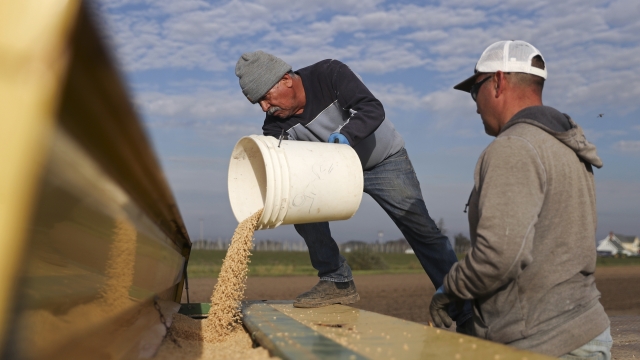A recent federal report describing the effects of climate change on the United States shows agriculture is particularly vulnerable.
The fifth National Climate Assessment cites how increasing temperatures and unpredictable weather is affecting crop yields. When it comes to the beer industry, some farmers are already adapting.
This time of year, most barley farmers are done with harvest. But at Gayle Goschie's farm about 30 miles outside Portland, Oregon, they're planting winter barley.
"It's been challenging in some ways, just because it's a new crop for us," Goschie said. "But there's a lot of success that we've seen and the customers that have been excited about it."
Goschie and her crew may be the future of beer as we know it, because it may depend on efforts like hers.
"For me the benefits of growing winter barley is, in my mind, sort of a bridge of climate change," Goschie said. "Going from not understanding what that means, to understanding that we need to be thinking about the future."
A key part of most beers is malt from barley; but farmers are seeing their barley crops impacted by extreme heat, drought and unpredictable growing seasons.
SEE MORE: Beer breweries are having to adapt to climate change conditions
Spring-planted barley is still used in most beer production. But the future may lie in winter barley.
That's barley that's planted in the fall, kept on fields during the winter and then harvested in the milder climates of late spring to early summer.
"It's been interesting to just think about the evolution of climate change as a farmer," Goschie said. "We were certainly looking at it from the research side, for all of agriculture. What did we need to be able to maybe make changes to be able to prepare for what was coming? And then all of a sudden, it was not coming any longer, it was here."
Another key ingredient in beer is hops — flowers that are the source of flavor and aroma — and they are also feeling the effects of climate change.
As CEO of Indie Hops, Jim Solberg is looking for the perfect hop, not just in taste but in sustainability as well.
The company works with Oregon State University plant geneticist Sean Townsend to develop hops for craft brewers.
"In any agricultural crop, you're having to stay ahead of pests, diseases and more recently we've had issues of climate change thrown at agriculture as well," Townsend said. "Be it varying temperatures at different times of the year, different levels of rainfall at different times of the year — sometimes too much, sometimes too little."
The company says trying to figure out how to create hops that thrive under changing weather takes expertise and patience.
Trending stories at Scrippsnews.com




